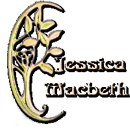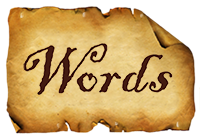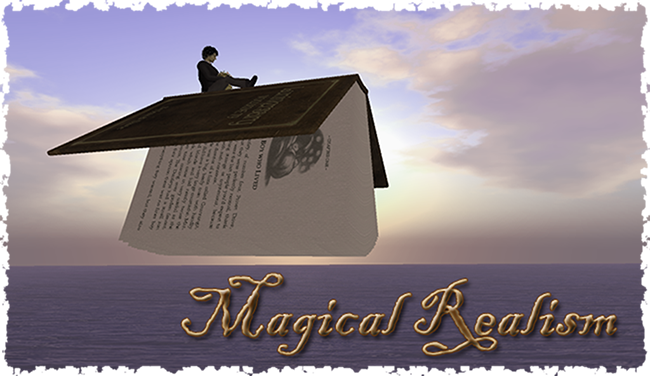
As you probably know, I'm writing a storybook (or several) about magic and faery and cats and things like that. But the thing about a sometime-healer writing about magic is that one already knows that magic is real. So the question arises: How do you write about magic that is natural and real and potent when fictional magic is usually so much more flashy and... um... misleading? Having Marzipan's story pushing at the back of my eyes, I knew I'd have to try — and, as is quite common with magic, once a person sets an intention or asks a question, the magic itself immediately starts trying to teach us. It uses magical means, of course. An untrained observer might call them co-incidence or synchronicity or even (and this is less likely to be said) a chronosynclastic infundibulum. Whatever. Let's ramble through some ideas here. Magical Realism The Writers Workshoppe decided (at just the right time) to offer a class in writing "magical realism". One important thing I learned in the class was that you could offer some outrageous magic if it was firmly embedded in a lot of detailed reality. You just have to slide the magic and "fantasy" in between the realism with enough down-to-earth detail that it goes almost unnoticed — and the next bit of fantasy can be even more magical and it too will just slide right into the mind without jarring it too much. Do you know why that is? (They didn't tell me this in the class, but I figured it out anyway.) This is because humans (and sometimes others) participate in magic all the time, and we're accustomed to just letting it slide by without notice. In fact, we pretend to ourselves that it either didn't happen or it happened some other "logical" way. So we don't notice how it sneaks up on us in reality or in a story if it's embedded in detail and factual information. Think about it: you remember that you want to phone a friend that you haven't talked to in quite a while. Within a few minutes, the friend phones you. Coincidence. Yeah, sure. It can't be telepathy because telepathy isn't real. So this is the fantasy that most of us believe and live in — the belief that magic is not real. We're habituated to that fantasy so we find all sorts of excuses to convince ourselves that telepathy doesn't happen. We invent words to cover it up — words like coincidence, lucky break, fortuity, synchronicity, and other words of that ilk. It can't be magic, not our own innate magic. It's just the way the cookie accidentally crumbles. No? So in your magical story you begin the shift with small details, like perhaps a yellow flower slowly turning red as a character watches, but you don't make a big drama with exclamation points and amazed expressions about it. It just happens in the background and you simply move smoothly right on by. A little later you slip another detail in. It's not important enough to stop and think too much about it. The reader just accepts it... and moves on. This is preparing the ground of the unconscious, imagining mind — the dreamer, the mystic, the magician within — to accept the seeds gently dropped and accept them again later on when they sprout and blossom more vividly. Magic isn't something you turn on and off. Your awareness of it may be awake or asleep, but dreaming or storytelling or being the story, the magic is what holds it together. But they (I'm writing here about faery magic, remember, and natural magic as well) had a lot more to teach me than just how to sneak up on magic in writing. Logic Things need to make sense — even in magic. Logic is important, so here is a logical "what if?" Take the "humna" (half faery and half human — see the title graphic to this essay which shows Bram Mackintosh transporting himself and his shop to Marzipan's world, Didean) in Marzipan's stories. Faery, as we know (!) exists and vibrates at a different and higher frequency than we do, just like ultra-violet light shines at a frequency that we don't normally see — our eyes are not built for it. We also know that there is a thing called "entrainment" that happens naturally. If you take two fine crystal glasses and set them beside each other and then gently strike one so it begins ringing, soon the other one is ringing as well. The second glass is entrained with the first because the first is actively vibrating the air, which carries the vibration to the other glass and sets it to ringing the same note. (This also happens in the chakra system, but we'll talk about that at another time in the Woo Woo Classes section of these pages, if I remember to do it.) So faery vibrates at a faster (higher) frequency than we humans do. If we spend time with them in the natural world, our vibration entrains a little to become higher as well — and it gradually changes our DNA so that we become more faery ourselves. This is just natural magic. Makes sense, doesn't it? Logical. Plausible. It especially makes sense if you consider the Japanese notion of forest bathing. Shinrin-yoku is a term that means "taking in the forest atmosphere" or "forest bathing." It was developed in Japan during the 1980s and has become a cornerstone of preventive health care and healing in Japanese medicine. Shinrin-yoku recognizes that we feel much more relaxed and healthy if we spend peaceful time in a forest. Trees. Dryads. Think about it. (Here's another thing to perhaps discuss later — the modern thing in some ethically and scientifically advanced cities is to build apartments with lush gardens on the roof and in large balconies outside the windows — what would that do to the people who live in them?) There is much to consider on this topic, including scientific studies that show that hyperactive children who spend some time in parks or natural place become calmer and cope with life better. It's all about being in a different frequency/vibration that is smoothly peaceful and not a jangling cacophony. This all has logic if you accept the basic premises and the comparisons. In fact, it's so logical that I've more than half convinced myself that this is how humans become a little (or a lot) faery. The Writer's Medicine Bag Another useful concept about writing that I came across recently was about medicine bags and the power objects in them. Ursula Le Guin wrote about it in "The Carrier Bag Theory of Fiction" in her book, Dancing At The Edge Of The World. This is something I feel every writer needs to read, even if they reject it. I've read the article online a couple of times myself and am waiting for the entire book from Amazon.) She talks about how every medicine bag contains power objects, and how together the objects contain more potency than each one alone. The objects blend together and reinforce each other — or conflict and weaken one another. As a writer, consider this: how is your story or thesis or novel a medicine bag imbued with the power to transform, to have a magical effect on the reader? How is each character a power object within that collective whole? If you think of them as a tribe, who serves which function in the society? How do they work together to get where they want to go? Is there any power object in the bag that conflicts with the overall goal? Can the power objects (people, places, things, ideas) find a resolution to any conflicts they have? And how do the power objects themselves change as a result of causing transformation around them — or, looked at in another way, how do their own transformations create metamorphoses in others like glasses vibrating together? These questions need to be answered — at least in our own minds if not in the story. The author actually needs to understand what's going on even if the characters are mystified. Image. I, mage. Transformation is vital. The other day a few people and I had a short discussion about what makes Sir Terry Pratchett's books so awesome — and I don't use that word lightly. To me, it's all about transformation. The characters in the stories (mostly) grow — like real people. This made me think a lot about what a "better person" is and why it's important to be one — and a TON of stuff about writing and a writer's responsibility to the rest of the world, especially when things are such a mess as they are now. Part of Sir Terry Pratchett's brilliance is that he showed us a path without ever "teaching" or "preaching" but by a sort of osmosis. I suspect he hoped we'd be smart enough to figure it out for ourselves, which is the only way to truly learn something. The Writer As Magician Are you aware that in writing or storytelling, you are practicing magic? Magic is basically about changing things without physically lifting or moving or carving them. What you are doing when telling a story is changing the world with ideas and mental images. An idea is like a virus — contagious. A virus drifts from one person to another, changing them, often without the recipients' awareness or conscious consent. A virus may also mutate — and that mutation may be different in each host, depending on the condition they are already in. I suspect that the idea-viruses may sometimes also travel by telepathy via vibrations on a plane or dimension we don't yet understand, but I can't prove that and I don't need to — we can just be hypothetical here. It's all theory, right? Except for whatever part is true. So you, as a writer/storyteller put ideas out into the world where others may catch and even mutate them from your original intention. What is the Path that you or I, as writers, are showing? Does it lead to a better world or worse? What is our intention here? Do we know? Are we, as ordinary magical people working on that intention consciously in our own lives? What is the effect we intend to have on the world?
Copyright ©2019 by Jessica Macbeth. All rights reserved.
|
|||||


